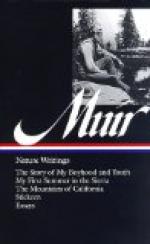as if covered by the edge of a dense cloud. This
proved to be an eclipse. Nevertheless, he fired
at the mother, and she immediately ran off, jumped
the fence, and took to the woods by the way she came.
The fawn danced about bewildered, wondering what had
become of its mother, but finally fled to the woods.
David fired at the poor deserted thing as it ran past
him but happily missed it. Hearing the shots,
I joined David to learn his luck. He said he
thought he must have wounded the mother, and when
we were strolling about in the woods in search of her
we saw three or four deer on their way to the wheat-field,
led by a fine buck. They were walking rapidly,
but cautiously halted at intervals of a few rods to
listen and look ahead and scent the air. They
failed to notice us, though by this time the moon was
out of the eclipse shadow and we were standing only
about fifty yards from them. I was carrying the
gun. David had fired both barrels but when he
was reloading one of them he happened to put the wad
intended to cover the shot into the empty barrel,
and so when we were climbing over the fence the buckshot
had rolled out, and when I fired at the big buck I
knew by the report that there was nothing but powder
in the charge. The startled deer danced about
in confusion for a few seconds, uncertain which way
to run until they caught sight of us, when they bounded
off through the woods. Next morning we found the
poor mother lying about three hundred yards from the
place where she was shot. She had run this distance
and jumped a high fence after one of the buckshot
had passed through her heart.
Excepting Sundays we boys had only two days of the
year to ourselves, the 4th of July and the 1st of
January. Sundays were less than half our own,
on account of Bible lessons, Sunday-school lessons
and church services; all the others were labor days,
rain or shine, cold or warm. No wonder, then,
that our two holidays were precious and that it was
not easy to decide what to do with them. They
were usually spent on the highest rocky hill in the
neighborhood, called the Observatory; in visiting
our boy friends on adjacent farms to hunt, fish, wrestle,
and play games; in reading some new favorite book
we had managed to borrow or buy; or in making models
of machines I had invented.
One of our July days was spent with two Scotch boys
of our own age hunting redwing blackbirds then busy
in the corn-fields. Our party had only one single-barreled
shotgun, which, as the oldest and perhaps because
I was thought to be the best shot, I had the honor
of carrying. We marched through the corn without
getting sight of a single redwing, but just as we
reached the far side of the field, a red-headed woodpecker
flew up, and the Lawson boys cried: “Shoot
him! Shoot him! he is just as bad as a blackbird.
He eats corn!” This memorable woodpecker alighted
in the top of a white oak tree about fifty feet high.
I fired from a position almost immediately beneath




